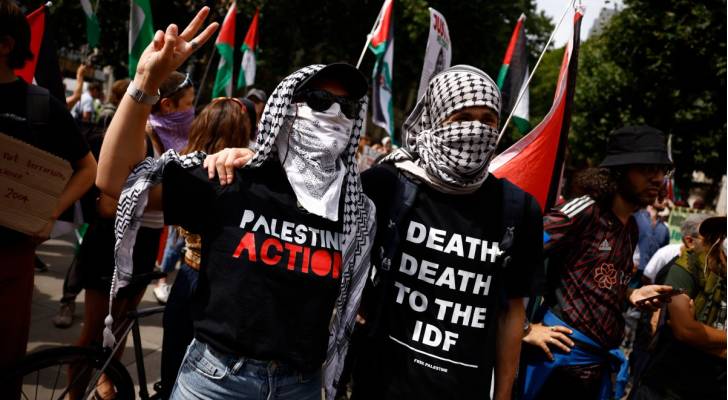Protesters gather outside the High Court in London on July 4, 2025 (Credit: AFP)
UK High Court rejects attempt to block Palestine Action's terror designation
Palestine Action is set to be officially proscribed as a terrorist organization after the High Court declined to pause the UK government’s decision to criminalize the group under counter-terror legislation.
The ruling came after lawyers representing Huda Ammori, co-founder of the pro-Palestine direct action group, applied for "interim relief" to temporarily block the move until a judicial review hearing scheduled for the week of July 21. The application was denied by Mr Justice Chamberlain, who ruled that public interest in allowing the proscription to proceed outweighed any potential harm should the challenge later succeed.
“I have concluded that the harm which would ensue if interim relief is refused but the claim later succeeds is insufficient to outweigh the strong public interest in maintaining the order in force,” he said.
Although the judge refused permission to appeal, Ammori’s legal team may still take their case to the Court of Appeal. Palestine Action said it is pursuing an “urgent” appeal that could be heard as early as Friday night.
The legal challenge comes after Home Secretary Yvette Cooper moved to designate Palestine Action as a terrorist group under the Terrorism Act 2000. Parliament overwhelmingly backed the decision, and the House of Lords has also approved the measure. The designation is set to take effect at midnight, making membership or support for the group a criminal offense punishable by up to 14 years in prison. Even displaying the group’s logo, on items like T-shirts or badges, could result in up to six months behind bars.
The move follows an incident on June 20, when two Voyager military aircraft were allegedly damaged at RAF Brize Norton in an action reportedly linked to Palestine Action. Police estimate the damage at around 7 million pounds (USD 9.5 million).
Addressing the court, human rights lawyer Raza Husain KC argued that the proscription marked a dangerous precedent. “This is the first time in our history a direct action, civil disobedience group which does not advocate violence has sought to be proscribed as terrorists,” he said. Husain compared the group’s activities to Britain’s long tradition of civil disobedience, referencing the suffragettes and anti-apartheid movements.
“We ask you to suspend, in the first instance until 21 July, what we say is an ill-considered, discriminatory, authoritarian abuse of statutory power that is alien to the basic tradition of common law and contrary to the Human Rights Act,” he told the court.
Blinne Ní Ghrálaigh KC, also representing Ammori, warned that the ban could extend far beyond the group’s core members. She said it could criminalize even symbolic expressions of solidarity, including wearing Palestine Action’s signature red boiler suits or the traditional keffiyeh scarf, which she said “could arouse suspicion of membership.”
“The chilling effect on protest and free speech will be severe and far-reaching,” she warned, noting the ban could impact “vast numbers” of people both in the UK and abroad.
Outside the courtroom, around 200 demonstrators rallied in support of Palestine Action, waving Palestinian flags, chanting, and holding placards. Counter-protesters were also present, with police deployed in large numbers to manage the scene.
Representing the government, Ben Watson KC defended the legality of the proscription and argued that the proper venue to challenge the decision was a specialist tribunal, not the High Court.
“Even if the court does conclude that there is some residual scope for judicial review… then we respectfully submit that the court needs to look at the bespoke regime that Parliament has provided,” he said.
Watson also argued that individuals formerly associated with the group would still be free to express political views, even through forms of protest that may be deemed criminal.
The government’s decision places Palestine Action on the list of banned groups alongside internationally recognized terrorist organizations such as Al-Qaeda, Daesh, and Hezbollah.




